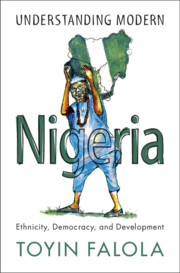Book contents
- Understanding Modern Nigeria
- Understanding Modern Nigeria
- Copyright page
- Dedication
- Contents
- Figures
- Maps
- Preface
- Acknowledgments
- Part I Introduction
- Part II Context and History
- Part III Democracy and Governance
- Part IV Development Crises
- Part V Reforms and Revolutions
- 19 Change Agents: Youths and Politics
- 20 Hashtags and Social Protests: Reformation and Revolution in the Age of Social Media
- 21 Reformist Option: Grassroots and Political Activism
- 22 Revolutionary Option: Social Movements and Power to the Citizens
- 23 Nationalist Ethos, Collective Reformation, and Citizenry Power
- 24 Popular Culture and Politics
- Part VI Conclusion
- Bibliography
- Index
24 - Popular Culture and Politics
from Part V - Reforms and Revolutions
Published online by Cambridge University Press: 09 June 2021
- Understanding Modern Nigeria
- Understanding Modern Nigeria
- Copyright page
- Dedication
- Contents
- Figures
- Maps
- Preface
- Acknowledgments
- Part I Introduction
- Part II Context and History
- Part III Democracy and Governance
- Part IV Development Crises
- Part V Reforms and Revolutions
- 19 Change Agents: Youths and Politics
- 20 Hashtags and Social Protests: Reformation and Revolution in the Age of Social Media
- 21 Reformist Option: Grassroots and Political Activism
- 22 Revolutionary Option: Social Movements and Power to the Citizens
- 23 Nationalist Ethos, Collective Reformation, and Citizenry Power
- 24 Popular Culture and Politics
- Part VI Conclusion
- Bibliography
- Index
Summary
“Popular Culture and Politics” seek to understand the influential force of popular culture, which can be optimized and utilized to transform the country’s sociopolitical future. As a social institution that arose from the forces of colonization, popular culture has a specific social role to play in that process. Characterized with an elastic capacity to instigate social ideas, popular culture in Nigeria can be used to bring about transformational changes and revolutionary thinking that can shape the Nigerian environment. Although the general belief is that popular culture serves as entertainment with no significant social benefits, that is not entirely the case. This study reveals the existing interconnection between politics and popular culture, highlighting the significance and the different approaches that can actively target a better Nigerian future through popular culture. Nigerian popular culture can use its transformational capacity to inspire desirable changes in the country’s political trajectory. It can be seen beyond its traditional role of entertainment, where it currently receives minimal national recognition. When the people who create cultural materials understand the power that they wield as a social institution, and when they use that power objectively, they can enact a revolution without violence.
- Type
- Chapter
- Information
- Understanding Modern NigeriaEthnicity, Democracy, and Development, pp. 578 - 600Publisher: Cambridge University PressPrint publication year: 2021

